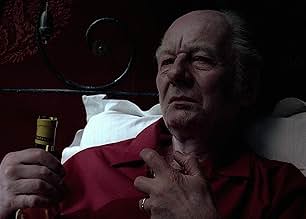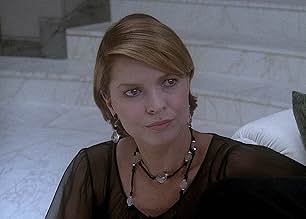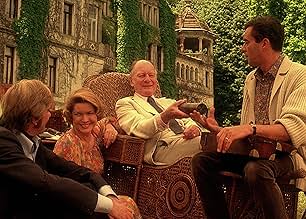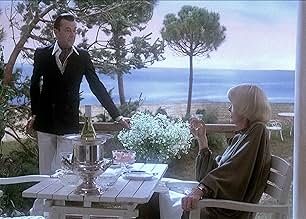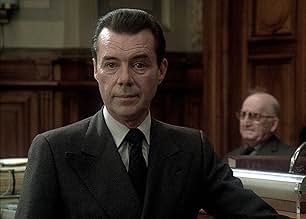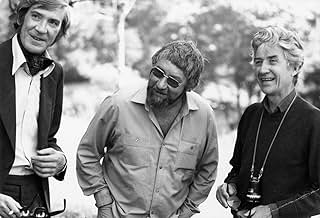AVALIAÇÃO DA IMDb
7,4/10
3,7 mil
SUA AVALIAÇÃO
Adicionar um enredo no seu idiomaA dying writer bases his last book on his own perception of his family.A dying writer bases his last book on his own perception of his family.A dying writer bases his last book on his own perception of his family.
- Prêmios
- 11 vitórias e 2 indicações no total
Denis Lawson
- Dave Woodford
- (as Dennis Lawson)
Avaliações em destaque
10flasuss
In Providence, his only film in English Language, Resnais again approaches the most recurrent subject in his career: the memory. Here, he explores how one's feelings can affect it: the life of the writer reflects directly on his view of his son and the wife of this one, and their respective (supposed) lovers, which actually are a representation of the writer's alienation, guilt and self-depreciation. It shows how memory can be more painful than any pain of the flesh, and even worse than reality itself. Like everything i've seen from Resnais so far (Night and Fog, Hiroshima Mon Amour, Mon Oncle D'Amérique and one of my favorite films, Last Year in Marienbad), this one is a very deep and original masterpiece.
This is one of the strangest movies I know. French intellectual aesthete meets contemporary British playwright - this should be the title of Providence. When two completely different cultures meet for a common project, the risk of failure is enormous. But in this case something interestingly and uniquely hilarious was created. Providence is a feverish dream that was successfully created for the screen.
The dream sequences of an old, dying writer, played by John Gielgud are absurd in a very British way. John Gielguds's upper class "king's English" voice-over adds effectively to its strangeness. As usual in contemporary British plays, sex and bowel movements are of the utmost importance . no, the script as a whole is neither very original nor particularly funny. I liked the incongruous, illogical situations though. Every now and then, in the most impossible situations, a strange, sickly looking football player (he seems to have fallen off Monty Python's Flying Circus) jogs limply past.
Director Alain Resnais is responsible for the dreamscapes, and they make Providence worth watching. Real settings are artfully distorted into haunting, surreal spatial sequences. Foreground and background, light and darkness, different textures and beautiful color arrangements are expertly arranged into a world of its own that is never too far from reality. One is sometimes reminded of Magritte's surrealistic paintings. Strange sounds add to the almost psychedelic effect the dream scenes have.
The acting is remarkable, especially Dirk Bogarde as the writer's slick, cynical «dream son» gives an outstanding performance.
The dream sequences of an old, dying writer, played by John Gielgud are absurd in a very British way. John Gielguds's upper class "king's English" voice-over adds effectively to its strangeness. As usual in contemporary British plays, sex and bowel movements are of the utmost importance . no, the script as a whole is neither very original nor particularly funny. I liked the incongruous, illogical situations though. Every now and then, in the most impossible situations, a strange, sickly looking football player (he seems to have fallen off Monty Python's Flying Circus) jogs limply past.
Director Alain Resnais is responsible for the dreamscapes, and they make Providence worth watching. Real settings are artfully distorted into haunting, surreal spatial sequences. Foreground and background, light and darkness, different textures and beautiful color arrangements are expertly arranged into a world of its own that is never too far from reality. One is sometimes reminded of Magritte's surrealistic paintings. Strange sounds add to the almost psychedelic effect the dream scenes have.
The acting is remarkable, especially Dirk Bogarde as the writer's slick, cynical «dream son» gives an outstanding performance.
10davidf33
A double header of complex imagination (first part) and painful recrimination (second part) in this film of deep feeling and hurt seen through the eyes of the dying author (John Gielgud). David Mercer's script includes all his life long angst of the relationship of father and son, although now in his final years fought out with more complex and participating female characters in the ghost of his dead wife, who doubles as his son's mistress (Elaine Stritch) and daughter-in-law (Ellen Burstyn).
The acting is pure poetry with John Geilgud at his refined best as the drunken and dying author in part celebrating his life of drunken womanising and in part regretting the pain that he has caused, in particular to his family. Dirk Borgarde performing the impossible task of being two imaginary characters and one real one with seemless effort. As the son of the dying author he carries all the pain and hatreds of the dying father both in the old man's fantasy and in his real life of inherited disillusionment. His relationship with his wife and mistress (in practice his mother! complex eh!) changes from the deeply loving to the perceive accusatory of the old man's increasingly drunken imagination.
Ellen Burstyn gives one of her finest film performances as the long suffering wife ,but in the end all the plaudits go to the writer. The style may be only that of the one-liner but each of them hits as an aphorism from the greatest of philosophical minds. The revolving characters of the final part of the authors dreaming make a bewildering tapestry of the imagination.
A fabulous movie, but one that will take many viewings to actually comprehend the complexities of it. Set that video!!
The acting is pure poetry with John Geilgud at his refined best as the drunken and dying author in part celebrating his life of drunken womanising and in part regretting the pain that he has caused, in particular to his family. Dirk Borgarde performing the impossible task of being two imaginary characters and one real one with seemless effort. As the son of the dying author he carries all the pain and hatreds of the dying father both in the old man's fantasy and in his real life of inherited disillusionment. His relationship with his wife and mistress (in practice his mother! complex eh!) changes from the deeply loving to the perceive accusatory of the old man's increasingly drunken imagination.
Ellen Burstyn gives one of her finest film performances as the long suffering wife ,but in the end all the plaudits go to the writer. The style may be only that of the one-liner but each of them hits as an aphorism from the greatest of philosophical minds. The revolving characters of the final part of the authors dreaming make a bewildering tapestry of the imagination.
A fabulous movie, but one that will take many viewings to actually comprehend the complexities of it. Set that video!!
A dying artist, beautifully acted by Fainsilber, struggles to complete one last book before he dies - the plot of which becomes confused with his own troubled life as he thinks and dreams his way through the night. This was the first film in English for master film-maker Alain Resnais, and also happens to be one of his best. Using a variety of surreal cinematic techniques, Resnais is able to capture the characters of everyone in the film perfectly and his style - combined with excellent scripting - makes for an experience that will not be forgotten. Although the first half of the film will probably be spent in confusion, before you actually realise what is going on - I had to see this film several times before I was satisfied - it is worth struggling to understand this complex and thoroughly entertaining artistic movie.
Not enough can truly be said for this film. Equally, nothing can change people's reaction to it; it is an art piece which separates people. Early reviews from the period of its release seem unfriendly at least. Many reviewers found the film pretentious and constructionally difficult. Many claimed it attempted more mystery than it had a right to. I feel this was a film ahead of its time, and any pomposity in the film comes not from its center, but from its central character, Clive Langham (John Gielgud). This, more than almost any film of the 20th century, is a film which rewards the viewer for multiple viewings. If you are often accused of being obsessive, overly-analytic or just plain artsy, this film will tickle you in some very personal places. The message I will refuse to comment on, though it is very deeply personal to me, and, I would say, to all writers. But the "crux of the biscuit," if you will, is this: examine the title in relation to the film.
Você sabia?
- CuriosidadesSir John Gielgud, who spent most of his career on the stage, considered this movie and the television mini-series Memórias de Brideshead (1981) to be his only two screen appearances of which he was genuinely proud.
- Citações
Clive Langham: Don't you think to have only one bastard after sixty years of action is almost tantamount to self denial?
- Cenas durante ou pós-créditosThe National Philharmonic Orchestra is misspelled as National Philarmonic Orchestra in the opening credits.
- ConexõesFeatured in Zomergasten: Episode #7.4 (1994)
Principais escolhas
Faça login para avaliar e ver a lista de recomendações personalizadas
Detalhes
- Tempo de duração
- 1 h 50 min(110 min)
- Cor
- Proporção
- 1.78 : 1(original ratio)
Contribua para esta página
Sugerir uma alteração ou adicionar conteúdo ausente

